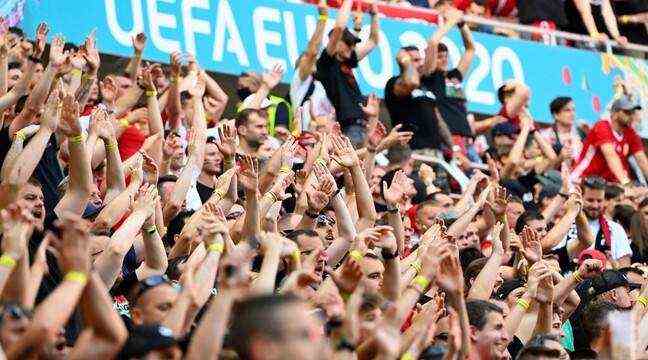This Friday, Spain faces Switzerland in Saint Petersburg in the quarter-finals of the Euro, in Russia. A country which at the same time records its fourth day in a row of daily record of coronavirus deaths, with 679 deaths, and which is plunged into a third very violent wave of the epidemic. However, tonight’s match will still welcome 30,000 spectators, with a gauge maintained at 50% throughout the competition, despite the new health situation in Saint Petersburg.
Yet a precedent could have – should have? – allow the gauge to be lowered, or even to play the match behind closed doors. On June 16 and 21, Finland played against Russia and Belgium in St. Petersburg, with crowds of spectators coming to watch the matches. On their return home, nearly 300 of them tested positive for Covid-19. A figure such as the mayor of Helsinki postponed the lifting of health restrictions in the capital.
Powerful clusters
Russia is not the only nation on the dock. England, where the Delta variant is in the ultra-majority and which is experiencing an epidemic outbreak, saw a surge of Scots in London for the Scotland-England poster. Many videos showed the legions in kilt invading pubs and singing in bars, airplanes, streets. A fun until the publication this week of a report published by Public Health Scotland, counting 2,000 contaminations among Scots who attended at least one Euro match between June 11 and June 18, including 1,300 for the match alone Scotland-England.
Is the Euro turning into a health bomb? “We cannot yet know the impact that this will have on the epidemic, but it is certain that this creates favorable conditions for the spread of the coronavirus and the Delta variant”, maintains Mahmoud Zureik, professor of epidemiology and public health at the University of Versailles-Saint-Quentin-en-Yvelines. The host cities for the matches were chosen before the competition, solely on the basis of measurement conditions and on the promise of providing a large number of spectators for the telegenic aspect of the competition. A choice that is proving disastrous, even if according to the professor, “UEFA will probably not back down, while measures should be taken, especially in view of the choices of the host cities, London and Saint Petersburg”.
The stadium and its side
Anne Sénéquier, doctor and co-director of the Observatory for Global Health, agrees: “To see a football match at the stadium is not to attend a game of chess, there are cries, songs, hugs. … Everything that must not be done in short. But beyond the stadium, there is everything else: the movement of people even without a ticket just to experience the match in the host city, as was the case in particular for the Scots in London. However, there too, it is the festival of non-barrier gestures: songs in closed, unventilated places, alcohol and the outpouring of tactile gestures in abundance. “We must avoid large population displacements, beyond the closed-door matches, it is the massive presence of people who have come to celebrate the match in a city that poses a problem,” recalls Mahmoud Zureik.
A problem taken very seriously by some countries. The England-Ukraine match is played in Rome, but Italy has banned the arrival of English supporters, due to the health situation across the Channel. A decision that Anne-Marie Trevelyan, British Minister of State, recommended to follow. “The countries have to make the decisions since it is unlikely that UEFA will react,” argues Mahmoud Zureik. Glass half full for him, half empty for Anne Sénequier. According to the doctor, this – good – decision also illustrates the problem: “Measures are taken by each country without being harmonized. “
The euro alone at fault?
For her, it is still necessary to put into perspective the impact of this Euro on viral circulation. Yes, he can clearly accelerate it, but he will not be solely responsible for an epidemic recovery if it occurs: “We are not going to blame the Euro on a potential fourth wave, it will just be one of the ingredients if it ebbs, but the recipe is more complex. »And to remember that this has nothing inescapable. She takes the example of the Christmas holidays, where many family gatherings had taken place without there being an explosion of cases, because people had been very careful before and after.
However, for Mahmoud Zureik, “It is a chance for France not to host matches on its soil and that its supporters do not go to Saint Petersburg or London. The elimination against Switzerland on Monday may have slowed down the Delta variant in France. Far from his fears and his considerations, the gauge of Wembley stadium in London, which host the two semi-finals and the final, will increase to 75% of the stadium’s capacity, or 60,000 people, as desired by UEFA.

